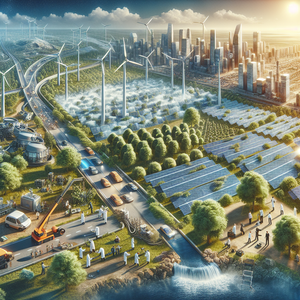
15 Careers Shaping the Future of Energy, Geoscience, and Environmental Sustainability: What You Need to Know for 2025 and Beyond
As the world continues to transition toward a cleaner, more sustainable future, the energy, geoscience, and environmental sustainability sectors are undergoing profound changes. The push for renewable energy, the gradual decline of fossil fuels, and global commitments to combat climate change are reshaping industries, sparking innovation, and creating new career opportunities. These shifts are not only transforming the way we think about energy and resources but also redefining the skills and expertise required in the workforce.
Job Summaries:
Geoscientist:
- Geoscientists study the Earth’s physical structure and processes, identifying natural resources like groundwater, oil, and minerals.
- They also help address environmental challenges, such as soil erosion and disaster risk mitigation.
- A bachelor’s degree in geology or geophysics is essential, while advanced degrees are often required for research.
- Proficiency in GIS and data analysis is increasingly valued.
- Geoscientists are transitioning from traditional resource extraction to sustainable resource management.
Mining Engineer:
- Mining engineers design systems for extracting minerals and resources with a focus on safety and environmental stewardship.
- A degree in mining or geological engineering is required, along with expertise in CAD software.
- Knowledge of sustainable mining practices is in high demand, particularly for extracting rare earth minerals essential for renewable energy technologies.
Petroleum Engineer:
- Petroleum engineers optimize oil and gas extraction methods, focusing on efficiency and minimizing environmental harm.
- A degree in petroleum engineering and expertise in advanced extraction technologies are necessary.
- While the outlook for petroleum engineering is dimming, there is growing interest in carbon-neutral extraction techniques and reducing methane emissions.
Renewable Energy Engineer:
- Renewable energy engineers design, develop, and implement systems for clean energy sources like solar, wind, and hydropower.
- A degree in renewable energy engineering or a related field is essential, along with expertise in energy storage and grid integration.
- These engineers are at the forefront of designing systems that address climate challenges while meeting energy demands.
Environmental Consultant:
- Environmental consultants advise businesses and governments on minimizing their ecological footprint, ensuring regulatory compliance, and managing environmental risks.
- A degree in environmental science or engineering is essential, with certifications like LEED adding credibility.
- They are instrumental in advancing green initiatives and reducing emissions.
Solar Energy Specialist:
- Solar energy specialists design, install, and maintain photovoltaic systems for residential, commercial, and industrial use.
- A background in electrical engineering or renewable energy technology, paired with certifications like NABCEP, is highly beneficial.
- Solar energy is becoming a dominant player in the renewable sector, making this career pivotal in the global clean energy transition.
Energy Policy Analyst:
- Energy policy analysts evaluate and develop government and corporate energy policies to promote sustainability and address climate change.
- A degree in public policy, environmental science, or economics is crucial, along with expertise in regulatory frameworks.
- Analysts are shaping policies that incentivize renewable energy adoption and drive decarbonization strategies worldwide.
Hydrogeologist:
- Hydrogeologists study the movement and quality of groundwater to ensure sustainable water use and supply.
- A degree in geology or hydrology is necessary, with advanced skills in GIS and groundwater modeling highly valued.
- This role is vital as global concerns over water security drive the need for better resource management.
Decarbonization Strategist:
- Decarbonization strategists develop and implement plans to reduce carbon emissions in industries and organizations.
- A background in environmental engineering, sustainability, or project management is essential.
- This emerging role is instrumental in guiding industries toward cleaner, low-carbon operations.
Offshore Wind Engineer:
- Offshore wind engineers design, construct, and maintain wind farms in marine environments.
- A degree in mechanical or marine engineering with a renewable energy focus is recommended.
- Innovations like floating wind farms are opening new possibilities for deep-sea renewable energy projects.
Carbon Capture Specialist:
- Carbon capture specialists design and operate systems to capture and store carbon emissions, reducing greenhouse gas outputs.
- A degree in chemical engineering or environmental science is essential, with expertise in sequestration technologies.
- Carbon capture is becoming a key strategy in mitigating industrial emissions and meeting climate goals.
Climate Data Analyst:
- Climate data analysts interpret climate data to assess risks and inform decision-making for governments and corporations.
- Proficiency in programming languages (Python, R) and climate modeling is critical.
- Predictive analytics and risk mitigation are central to this role as organizations adapt to climate change.
Energy Efficiency Specialist:
- Energy efficiency specialists identify and implement strategies to reduce energy waste in buildings and industrial systems.
- A degree in mechanical or energy engineering, with certifications like CEM, is beneficial.
- Retrofitting older systems and integrating smart technologies are key aspects of this profession.
Seismologist:
- Seismologists study seismic activity to inform disaster preparedness and infrastructure safety.
- Often requires a Ph.D. in geophysics or a related field.
- This role is critical for mitigating natural disaster risks.
Geological Data Technician:
- Geological data technicians collect and analyze data to support environmental and resource management projects.
- A degree in geology or GIS is typically required.
- These technicians serve as a bridge between traditional energy projects and sustainable practices.
The careers outlined above represent the forefront of energy, geoscience, and sustainability. As industries adapt to a changing world, these roles offer exciting opportunities to make a tangible impact. Whether you're looking to transition from a traditional sector or start fresh in a growing field, the future of work in these industries is filled with promise. Take the first step today by exploring certifications, training programs, or mentorship opportunities to align your skills with the needs of tomorrow’s workforce.
Explore More Jobs

